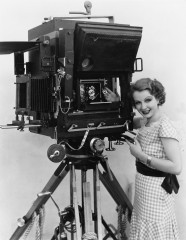 The first recorded public screening of a projected film with sound took place in Paris in 1900, although motion pictures incorporating sound were not made financially viable until the 1920s, this time in New York City.
The first recorded public screening of a projected film with sound took place in Paris in 1900, although motion pictures incorporating sound were not made financially viable until the 1920s, this time in New York City.At first, only shorts (short films) included synchronised dialogue and were known as “talking pictures” or “talkies”.
The first feature-length films with sound included only music and effects, an example of which is the 1927 German film Metropolis: a futuristic urban dystopia. Instead of dialogue, Metropolis uses occasional text slides to show speech.
The first feature-length film to be presented as a “talkie” was the American musical film, The Jazz Singer (1927). The film stars Al Jolson as Jakie Rabinowitz, a thirteen-year-old boy whose controlling father insists that Jakie must continue the family tradition and become Cantor at the local synagogue. However, Jakie is more interested in performing popular jazz music at the beer garden and, when his father finds out, he is dragged home and whipped. After saying goodbye to his mother, Jakie runs away, just as he'd said he would if his father ever whipped him again.
Ten years later, Jakie Rabinowitz goes by the name of Jack Robin, a rising jazz star. When his father falls gravely ill, Jakie/Jack has to make the difficult choice between his family and his career: His father will forgive him if Jakie sings as Cantor in his place, but this event falls on the same night as Jakie/Jack's Broadway première.
Despite being warned by his producer that he'll never work on Broadway again if he fails to show on opening night, Jakie chooses family and forgiveness over his profession. However, he does ultimately end up with a successful career, anyway.
The film ends with Jack performing a song dedicated to his mother, who is watching from the audience: He has finally found a way to successfully balance both family and career without sacrificing either.
The film ends with Jack performing a song dedicated to his mother, who is watching from the audience: He has finally found a way to successfully balance both family and career without sacrificing either.